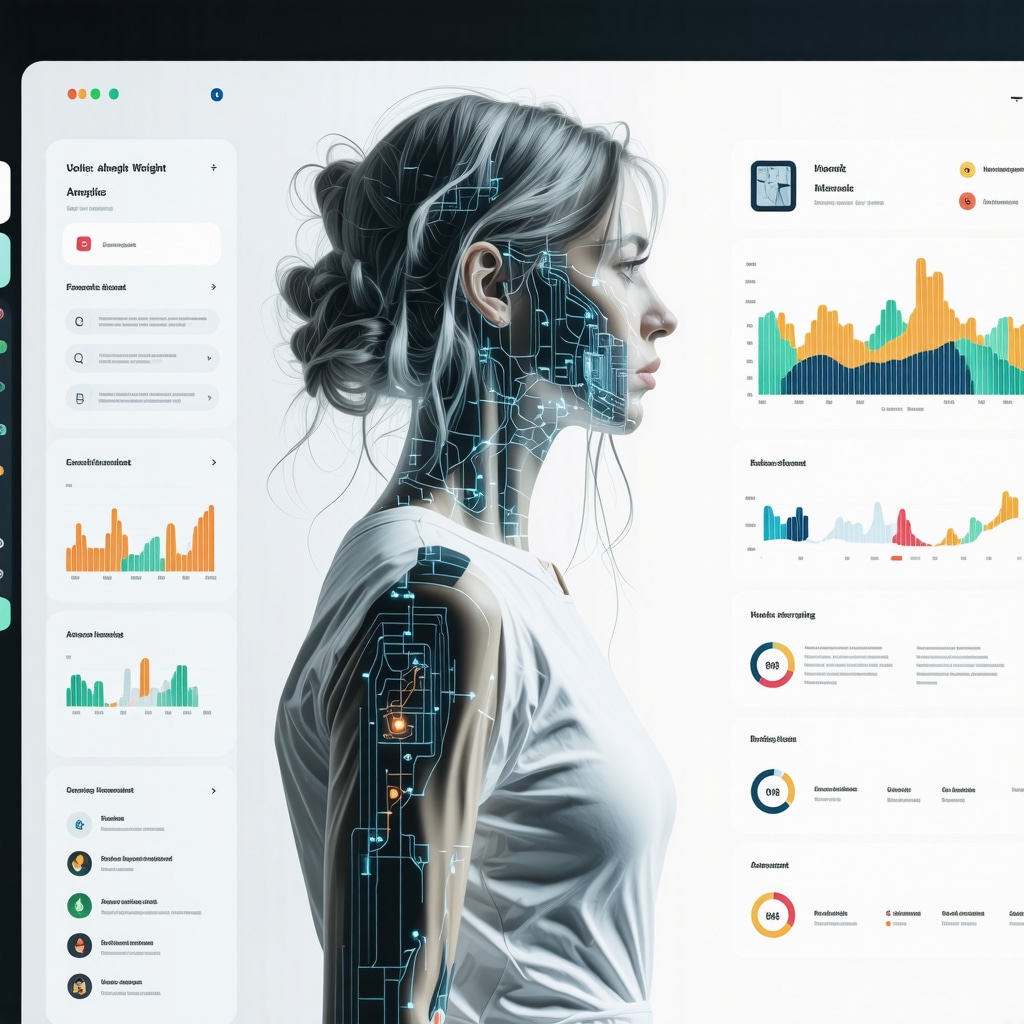Revolutionizing Weight Management: The Power of Telemedicine in 2025
In the rapidly evolving landscape of medical technology, telemedicine has transcended traditional boundaries to become a cornerstone of personalized weight loss strategies. As we venture into 2025, the integration of sophisticated online telemedicine treatments signifies a paradigm shift towards safer, more effective, and accessible solutions for obesity management. Leveraging expert insights and cutting-edge research, this article explores the complex dynamics shaping the future of virtual weight loss interventions.
How Do Telemedicine Platforms Enhance Precision in Weight Loss Protocols?
Advanced telemedicine platforms utilize AI-driven data analytics, real-time health monitoring, and personalized medical consultations to tailor weight loss treatments. This precision medicine approach ensures that interventions such as prescription medications and injectable therapies are optimized for individual metabolic profiles, genetic predispositions, and lifestyle factors. Experts emphasize that the success of these programs hinges on continuous remote assessments, which facilitate dynamic adjustments to treatment plans, thereby maximizing efficacy while minimizing adverse effects.
What Are the Emerging Pharmacological Innovations in Virtual Weight Loss Care?
2025 witnesses the advent of novel GLP-1 receptor agonists and dual agonists such as Tirzepatide, which demonstrate superior efficacy in weight reduction compared to earlier medications like Semaglutide. These drugs, administered via telemedicine, are supported by rigorous clinical trials attesting to their safety and long-term benefits. The seamless prescription process, combined with remote patient monitoring, allows for vigilant management of side effects and adherence, elevating the standard of care. For comprehensive insights on these medications, refer to Semaglutide vs Tirzepatide.
Can Telemedicine Bridge the Gap Between Efficacy and Accessibility?
One of the most profound advantages of online weight loss treatments lies in their ability to democratize access to expert care. Patients in remote or underserved regions benefit from virtual consultations with specialists, who can prescribe FDA-approved medications, recommend lifestyle modifications, and coordinate multidisciplinary care teams. Moreover, the integration of wearable devices and telehealth apps enables real-time tracking of progress, fostering accountability and motivation. This accessibility accelerates treatment initiation, which is vital for addressing obesity-related comorbidities effectively.
How Do Telemedicine Weight Loss Treatments Address the Complexities of Obesity?
Obesity is a multifaceted condition influenced by genetic, psychological, and environmental factors. Telemedicine approaches incorporate behavioral therapy, nutritional counseling, and pharmacotherapy into cohesive, patient-centered plans. By leveraging digital platforms, clinicians can monitor psychological well-being, dietary adherence, and physical activity, adjusting interventions as needed. This holistic approach aligns with expert recommendations for comprehensive obesity management, emphasizing both medical and lifestyle components.
For those interested in the legal and safety aspects of these treatments, it is advisable to consult resources such as Legal Weight Loss Drugs and Expert Advice for Safe Use.
As the field advances, ongoing research and regulatory oversight will continue to refine the safety profiles and efficacy of telemedicine weight loss treatments, fostering a landscape where science and technology synergize to combat obesity effectively.
Explore the latest innovations and collaborate with healthcare professionals to tailor a plan suited to your unique needs. For expert guidance, visit our Contact Us page and join the conversation on shaping the future of weight management.
Harnessing Data Analytics for Personalized Weight Management in Telemedicine
As telemedicine continues to evolve, the integration of advanced data analytics plays a pivotal role in customizing weight loss programs. By analyzing vast datasets from wearable devices, electronic health records, and patient-reported outcomes, clinicians can develop highly individualized treatment plans that account for genetic, metabolic, and behavioral factors. This approach not only enhances the precision of interventions like prescription medications and injectable therapies but also fosters proactive adjustments based on real-time data, thereby improving long-term success rates.
What Are the Ethical and Privacy Considerations in Digital Weight Loss Solutions?
With the proliferation of telehealth platforms and digital tracking tools, safeguarding patient data becomes paramount. Experts emphasize the importance of strict compliance with regulations such as HIPAA, along with transparent data management policies. Patients must be confident that their sensitive health information remains confidential and is used ethically. For more insights on privacy policies and legal safeguards, visit Privacy Policy and Legal Frameworks.
Can AI-Driven Virtual Coaches Revolutionize Adherence and Motivation?
Emerging AI-powered virtual coaching systems are designed to provide continuous motivation, personalized feedback, and behavioral support. By simulating human interactions, these digital coaches can address psychological barriers, reinforce healthy habits, and adapt strategies to individual progress. Such tools hold promise for increasing adherence to complex weight management plans, especially when combined with pharmacotherapy and lifestyle counseling. The development of these intelligent systems is supported by research published in the Journal of Medical Internet Research, highlighting their potential to augment traditional care models.
How Can Healthcare Providers Balance Innovation with Evidence-Based Practice?
While technological advancements open new frontiers in weight management, clinicians must remain grounded in evidence-based practices. This involves critically appraising emerging treatments, understanding their safety profiles, and integrating them within comprehensive care frameworks. Engaging in continuous education and consulting reputable sources such as Expert Advice for Safe Use ensures that innovative solutions are applied responsibly. Striking this balance is crucial for maintaining trust and optimizing patient outcomes in the rapidly changing landscape of virtual weight loss care.
If you’re interested in exploring more about how digital health tools can enhance your weight management journey, consider sharing your thoughts below or visiting our Contact Us page for personalized guidance.
Integrating Genomic Data for Ultra-Personalized Weight Loss Interventions
One of the most exciting frontiers in telemedicine-based weight management is the incorporation of genomic information to tailor interventions. By analyzing genetic markers related to metabolism, appetite regulation, and drug response, clinicians can develop highly individualized treatment plans that optimize efficacy and minimize adverse effects. For example, variants in the FTO gene have been associated with obesity susceptibility and can influence response to dietary modifications and pharmacotherapy. Leveraging direct-to-consumer genetic testing combined with telehealth consultations allows for a nuanced approach that considers each patient’s unique biological blueprint.
How does integrating pharmacogenomics improve telemedicine weight loss outcomes?
Pharmacogenomics, the study of how genes affect drug response, enables clinicians to predict which medications will be most effective and safe for individual patients. In virtual weight management programs, this means selecting the optimal GLP-1 receptor agonist or dual agonist based on genetic profiles, reducing trial-and-error prescribing, and enhancing adherence. According to a 2024 study published in Nature Medicine, pharmacogenomic-guided therapy significantly improves weight loss outcomes and reduces side effects, highlighting its potential to revolutionize telemedicine practices (source).
Leveraging Behavioral Analytics with AI for Dynamic Engagement
Behavioral change remains the cornerstone of sustainable weight loss. Advanced AI algorithms integrated into telehealth platforms analyze user interactions, dietary logs, sleep patterns, and physical activity data to identify behavioral patterns and potential barriers. These insights allow for real-time, tailored motivational messages, adaptive goal-setting, and personalized coaching. For instance, if a patient’s data indicates declining motivation or inconsistent calorie tracking, the AI system can proactively intervene with supportive prompts or suggest adjustments to the treatment plan, fostering continuous engagement and accountability.

What are the ethical considerations when deploying AI for behavioral modification in weight management?
Deploying AI-driven behavioral interventions raises critical ethical questions regarding data privacy, consent, and algorithmic transparency. Ensuring that patient data is securely stored and used ethically is paramount, particularly given the sensitive nature of health-related information. Moreover, AI systems must be designed to avoid biases that could lead to unequal treatment or reinforce stereotypes. According to the PLOS Medicine guidelines, transparent algorithms and informed consent are essential for maintaining trust and upholding ethical standards in digital health interventions (source).
Future Directions: The Convergence of Virtual Reality and Telemedicine in Weight Loss
Looking ahead, the integration of virtual reality (VR) with telemedicine platforms promises immersive experiences that can enhance behavioral therapy efficacy. Patients could participate in virtual grocery shopping, cooking classes, or guided physical activities from their homes, making lifestyle modifications more engaging and realistic. Early pilot studies suggest that VR-based interventions can improve adherence to dietary and exercise regimens, especially among younger populations comfortable with digital environments. As hardware costs decrease and software becomes more sophisticated, VR could become a standard adjunct in virtual weight management programs, providing a multisensory approach to behavior change.
To stay at the forefront of this technological evolution, healthcare providers should consider ongoing training and investment in VR-capable telehealth systems, ensuring they can deliver comprehensive and engaging care tailored to modern digital expectations. For more insights into emerging virtual solutions, consult resources such as HealthTech Magazine.
The Integration of Multi-Omics Data for Ultra-Targeted Weight Management Strategies
Emerging advancements in multi-omics—encompassing genomics, proteomics, metabolomics, and microbiomics—are revolutionizing personalized weight management. By integrating these complex biological datasets within telemedicine platforms, clinicians can achieve unprecedented precision in tailoring interventions that account for individual metabolic pathways and microbiome compositions. This holistic approach enables the customization of diet plans, pharmacotherapy, and behavioral interventions, significantly enhancing efficacy and minimizing adverse effects.
How Do Multi-Omics Data Contribute to Optimizing Telehealth-Based Obesity Treatments?
Multi-omics profiling elucidates the intricate biological networks underlying obesity, offering insights into genetic predispositions, metabolic fluxes, and gut microbiota influences. When combined with AI-driven analytics in telemedicine, these insights facilitate dynamic, evidence-based modifications to treatment protocols, fostering sustained weight loss and improved health outcomes. According to a comprehensive review in Nature Reviews Endocrinology, integrating multi-omics data into clinical decision-making enhances predictive accuracy and personalizes therapy at an unprecedented level (source).
Engaging with such cutting-edge strategies requires a keen understanding of complex biological data interpretation and its clinical application. For healthcare providers, mastering multi-omics integration will be essential to lead the next generation of virtual obesity care.
Harnessing Blockchain Technology for Secure and Transparent Digital Health Data Exchange
In an era where data security and privacy are paramount, blockchain technology offers a transformative solution for managing sensitive health information in telemedicine platforms. Blockchain’s decentralized ledger system ensures tamper-proof, transparent, and secure exchanges of patient data, fostering trust among users and providers alike. This innovation not only enhances compliance with regulations such as HIPAA but also streamlines interoperability among diverse digital health systems.

What are the Practical Implications of Blockchain Adoption in Telehealth Ecosystems?
Implementing blockchain can facilitate seamless, secure sharing of medical records, treatment histories, and genetic data, enabling coordinated, multidisciplinary care. Moreover, smart contracts can automate consent management and data access permissions, empowering patients with control over their information. According to a detailed analysis in IEEE Transactions on Information Technology in Biomedicine, blockchain integration can significantly reduce administrative burdens and data breaches, fostering a more trustworthy virtual healthcare environment (source).
Healthcare organizations aiming to adopt blockchain should consider strategic partnerships with cybersecurity experts and regulatory bodies to ensure compliant and scalable deployment.
Innovative Use of Virtual Reality for Immersive Behavioral Therapy in Weight Management
Virtual reality (VR) is poised to transform behavioral therapy by providing immersive environments that promote healthier habits and enhance motivation. Patients can virtually navigate grocery stores to practice mindful shopping, participate in simulated exercise routines, or engage in stress-reduction scenarios—all from the comfort of their homes. Early pilot studies demonstrate VR’s potential to increase adherence and emotional engagement, particularly among tech-savvy younger populations.
To stay competitive, clinicians and tech developers must collaborate to create evidence-based VR applications that align with behavioral science principles, ensuring these tools are effective and accessible.
Expert Insights & Advanced Considerations
Innovative Personalization Techniques Are Transforming Outcomes
Leveraging multi-omics data integration allows clinicians to craft highly individualized weight management plans, enhancing efficacy and reducing adverse effects. This approach moves beyond traditional methods, emphasizing precision medicine tailored to each patient’s unique biological makeup.
Ethical Deployment of AI Ensures Trust and Effectiveness
The ethical use of AI in behavioral analytics hinges on robust data privacy measures, transparent algorithms, and informed patient consent. Adherence to standards like HIPAA and ongoing oversight are critical for maintaining trust in digital health interventions.
Virtual Reality as an Engagement Catalyst
Immersive VR experiences are emerging as powerful tools to promote behavioral change, providing realistic simulations for shopping, exercise, and stress management. This technology enhances engagement, especially among younger, tech-savvy populations, and could redefine adherence strategies.
Blockchain for Secure Data Sharing
Blockchain technology offers a decentralized, tamper-proof framework for managing sensitive health data, facilitating secure interoperability among platforms. Its adoption can streamline care coordination and bolster patient confidence in digital health solutions.
Future of Multi-Omics and Telehealth Synergy
The convergence of multi-omics data with telemedicine analytics heralds a new era of ultra-personalized obesity treatments, allowing for dynamic, evidence-based adjustments that optimize long-term health outcomes.
Curated Expert Resources
- Nature Medicine: Cutting-edge research on pharmacogenomics and personalized medicine in weight management. Read more
- IEEE Transactions on Information Technology in Biomedicine: Insights into blockchain applications for secure health data exchange. Explore the details
- PLOS Medicine: Ethical considerations in AI-driven behavioral health interventions. Learn more
- HealthTech Magazine: Innovations in virtual reality applications for health behavior change. Discover the latest
Final Expert Perspective
The trajectory of telemedicine in weight management 2025 underscores a future where personalized, ethically driven, and technologically integrated solutions redefine patient care. Embracing these advancements requires a commitment to continuous learning and ethical integrity, ensuring that innovative tools serve to enhance outcomes and trust. Engage with these insights and resources to stay at the forefront of this transformative field. Your expertise and proactive adaptation will be vital in shaping successful, sustainable weight management strategies in the years ahead.

This article provides a comprehensive view of how telemedicine is transforming weight management in 2025, especially with the integration of genetics and AI analytics. I’ve personally seen how remote monitoring and personalized plans have increased motivation and accountability for some of my clients. The potential of pharmacogenomics to tailor medication response is particularly exciting, as it could reduce trial-and-error prescribing and side effects. However, I wonder how healthcare providers can best educate and support patients in understanding complex data like genetics and multi-omics. Do others have experience with effectively communicating these personalized insights to enhance adherence? It seems that clear, accessible explanations are key to making these advanced tools truly effective in everyday practice.
Reading this article really highlights how far telemedicine has come in revolutionizing weight management by 2025. I’ve been involved in virtual health programs where real-time data analytics and AI-driven coaching have made a noticeable difference in patient motivation. The integration of pharmacogenomics is especially promising; it allows us to personalize treatments more precisely, potentially reducing side effects and improving adherence. I am curious, though, about the practical challenges of implementing these advanced concepts widely—like ensuring equitable access or maintaining patient understanding of complex data. How do other practitioners approach explaining genomic and multi-omics information in a way that’s understandable and empowering for patients? I believe that the key lies not just in technological innovation but also in how we communicate and educate our clients effectively. What strategies have you found useful in translating complex biological data into actionable patient insights?